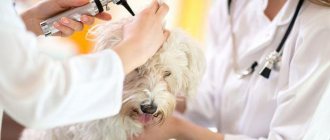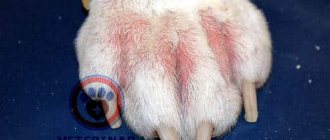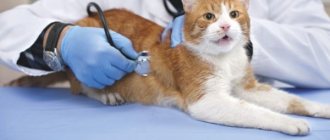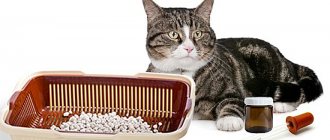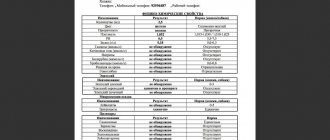The physical properties of urine are the parameters of urination and the properties of urine that the dog owner can evaluate with the naked eye or determine using the sense of smell.
An extended general clinical examination of urine can provide a lot of diagnostic information about how the organs of the dog’s urinary system work, as well as about its general condition. Using this study, it is possible to track the dynamics of changes in the course of many diseases and evaluate the response to treatment.
The main thing that the owner should know is that if the pattern of urination and the smell of the pet’s urine has changed, then the first thing to do is take the urine for analysis.
Changes in the frequency of urination and the amount of urine can be a very important warning sign indicating the presence of a disease. They are expressed in an increase in the amount of urine (polyuria), a decrease (oliguria), or absence (anuria) of urine. And it is important not to confuse polyuria with urinary incontinence or frequent urination (pollakiuria), and oliguria and anuria with stranguria - difficult, frequent and painful urination. All this data can be obtained by direct observation of the animal during urination.
An increase in the amount of urine (polyuria) can occur with increased thirst (polydipsia), such animals feel a frequent urge to urinate and produce more urine per day. Very often, these two symptoms are associated with each other and appear with purulent inflammation of the uterus and other intoxications, diabetes, and renal failure.
A decrease in diuresis (oliguria) occurs with insufficient fluid intake, diseases accompanied by an increase in body temperature, vomiting, diarrhea and other pathologies. A sharp decrease in diuresis, up to the complete cessation of urine output (anuria), is observed in diseases that cause acute renal failure (kidney disease, impaired urine outflow, heart failure, disseminated intravascular coagulation syndrome, piroplasmosis, leptospirosis, poisoning, etc.).
Frequent urination can occur with cystitis, prostate diseases, vaginitis, and in an excited state. In addition, various neurological disorders, both local (for example, herniated disc, Cauda equina syndrome) and central origin, are often accompanied by both urinary incontinence and difficulty urinating, from rare involuntary urination to a complete inability to empty the bladder independently.
The color of urine is another important sign that can indicate to the owner that there is a problem. Normal urine is straw-yellow in color. The color is influenced by the concentration of urine (darker with diarrhea and vomiting, slightly colored - with increased fluid intake, while taking diuretics, with a decrease in the ability of the kidneys to concentrate urine), the use of medications that change the color of urine (see instructions for use), some products (this mainly concerns vegetables - carrots, beets) that animals can theoretically eat.
With various pathologies, the color of urine can change to pale yellow (with polyuria), dark yellow, yellow-orange, up to the “color of beer” (with liver diseases), milky white (with an increased content of leukocytes, for example, with urinary infections paths). With such changes, it is necessary to undergo an analysis and establish the cause of the pathology.
The most common change in urine color is red, brown, brown-black. This can be observed when blood is released in the urine (macrohematuria) or hemoglobin (microhematuria), which appears when red blood cells break down. It is possible to distinguish these two conditions only by laboratory methods. And since the cause of hematuria can be a very dangerous, fatal, acute disease (for example, poisoning with hemolytic poison, piroplasmosis, disseminated intravascular coagulation syndrome, renal bleeding), you should immediately consult a doctor and submit a urine test to the laboratory.
Normally, urine should be clear. Cloudiness can be caused by the presence of salts, cellular elements, mucus, bacteria, and fats. Changes in urine clarity may be one of the first signs of urolithiasis or urinary tract infections. The cause of the turbidity is determined by microscopic and chemical examination.
A change in the smell of urine is a fairly rare occurrence; the acrid smell of urine , the fetid smell of “meat slop” can appear when there is a large number of bacteria, the pungent smell of urine can occur when urine stagnates for a long time in the bladder, for example, when the urinary tract is blocked.
If you notice even the slightest change in the nature of urination, urine color, smell, or deterioration in the dog’s condition, you must definitely visit a doctor, tell about all the changes and observations, and immediately conduct laboratory tests.
If you found the page interesting and useful or have something to share, please leave your comment. We will be very grateful to you. ☸ ڿڰۣ–
Bad breath is a kind of defect that plagues not only people, but also animals. A dog has a specific odor from his mouth very often. Owners of four-legged friends often explain this phenomenon by poor oral hygiene of the dog. Is this really so, and why does the dog’s breath smell, we will consider in this article.
What causes an unpleasant odor
The manifestation of foul breath is not always limited to improper hygiene. Even the most attentive and caring owner's dog can suffer from this phenomenon. The terrible smell of ammonia, rotten fish or acetone immediately raises fears that the pet is unhealthy.
There are many ailments that rarely show their symptoms. Why you need to immediately determine the root cause of why your dog’s breath stinks and carry out the correct course of therapy.
Rotten meat and rot
Causes:
- Dental problems. The first association with an unpleasant “aroma” from a pet’s mouth should be problems with the teeth or the oral mucosa. To verify or refute this reason, you need to conduct an independent examination.
Healthy mucous membrane is pale pink; there should be no scratches, cuts, or ulcers.Then you need to examine your teeth to see if they have caries or not. If plaque is found in the mouth, it must be carefully removed. Also, bad breath for this reason is a signal to review your diet.
If you still smell rotten, most likely there are more serious reasons (below) and you need to go to the doctor.
- Diseases of the kidneys and/or urinary system. Most often, older dogs (more than 10 years old) suffer from this problem. The dog drinks a lot and, as a result, often goes to the toilet. This happens much less frequently, but sometimes it still happens that these urges are not always accompanied by urine discharge. The general condition is most often sluggish.
- Digestive disorders.
If a dog’s mouth suddenly begins to stink very strongly of rotten meat, then this may be one of the symptoms of the onset of gastritis or intestinal obstruction, as well as stagnation of semi-digested food in the intestines. Also, low-quality, cheap food may well be the cause of the unpleasant odor. Try feeding the animal natural, high-quality food for 2-3 weeks, walking it for min. 30 minutes 2 times a day, then most likely, digestion will improve, which means, as a result, the stench will disappear. - Respiratory problems. If a dog has become infected with an infection, and this infection is in the respiratory tract, then there may be a “rotten” smell from the mouth. Additional symptoms are most likely a cough and fever, possibly a runny nose. It is important to remember that this can be a symptom of distemper, which can be fatal.
- Diabetes. Yes, it affects not only people, but also dogs. Associated symptoms: sudden weight loss and constant thirst.
The breath of a young puppy and a young dog smell disgusting
This unwanted pathology can affect not only adult pets, but also small dogs.
The factors are:
- Replacement of teeth. Small dogs (Spitz, Pekingese, Yorkie, Chihuahua, dwarf dachshund) have milk teeth that are difficult to loosen and do not fall out without the help of others. Tightly seated teeth violate the integrity of the gums, thus causing inflammatory processes. All this provokes a disgusting putrid smell from the mouth of the four-legged pet.
- Foreign bodies. A small puppy often plays and may not control himself during play, gnawing sticks or other objects into small pieces. The residue settles between the incisors, causing swollen gums and a bad odor.
- Leftover food. Food stuck in teeth will sooner or later decompose. If it is not removed and cleaned in time, the pet will also develop a rotten smell from its mouth.
Cleaning rules
Until the puppy is tamed to walk and has received the necessary vaccinations, puddles will appear at home on parquet, linoleum, carpet and other similar places. Only after a month or less will the puppy be able to learn to endure until the owner takes him for a walk.
While the puppy is small, you need to remember the rules for eliminating puddles:
- Don’t delay, start eliminating the puddle immediately, otherwise it will be very difficult to get rid of the old stain.
- If your puppy poops on carpet or fabric, do not wipe the area with a wet rag, but simply blot with a paper napkin or toilet paper until everything is dry.
- Under no circumstances should you remove a puddle from the carpet using rubbing movements, this will only spread the urine throughout the area and then it will be very difficult to get rid of the smell.
- If you are unsure about the detergent, test it on a small area.
- Parquet and laminate flooring should be wiped down immediately before it absorbs urine. Otherwise, it will be very difficult to get rid of the unpleasant aroma later.
- Just in case, purchase an ultraviolet lamp that will help identify traces of urine in hidden places.
A mature dog smells bad
The reasons that cause bad breath in a mature dog are already more extensive.
What signals pathologies:
- Tartar.
Factor of the dental kind, which is a repeated reason for the manifestation of a nasty stench from the dog’s mouth. Many dog breeders ignore this sign, mistakenly believing that plaque does not pose any threat to the animal. But damaged tooth enamel can become a hotbed for the development of infections, which will ultimately adversely affect the health of your four-legged pet.
- Neoplasms of benign and malignant nature.
Small tumors in a dog’s mouth not only cause discomfort to the pet, but also cause a terrible stench.
- Urinary tract diseases.
Often the smell of urine or ammonia from a dog's mouth can indicate chronic renal failure. The animal's metabolism slows down, which contributes to the abundant release of ammonia.
The pungent smell of acetone can be an important indicator that a dog has diabetes. By closely observing the dog, it is quite possible to make a diagnosis yourself. Diabetes mellitus causes extreme thirst, and your four-legged friend drinks a lot of fluids. In this case, you need to take a blood test for sugar and listen to the veterinarian’s recommendations on further actions.
Dog urine smells bad
So I’m saying that there is no such possibility yet. And I can’t imagine how you can take a bitch’s urine for analysis? She doesn't pee in the tray.
We recommend reading: Tylosin For Mycoplasmosis In Dogs
But she pees at home. Is the clinic also out of reach?
Only registered users have the ability to start new topics. Register and log in to the site by entering your username and password on the right side of the window, and you can start a new topic.
Before visiting the forum, read the topic: “How to properly consult a veterinarian,” as well as the list of answers to frequently asked questions, this will help you save your time and get an answer to your question faster. Pay special attention to the document: Symptoms of animal diseases. Perhaps in your situation you cannot expect an answer on the forum, but you need to urgently call a doctor or take the animal to a veterinary clinic!
Before joining the forum, read the following sections, this will help save your time and quickly get an answer to your question:
Attention! Pay special attention to the document “Symptoms of Animal Diseases”. Perhaps in your situation you cannot expect an answer on the forum, but you need to urgently call a doctor or take the animal to a veterinary clinic!
Only registered users have the ability to start new topics. Register and log in to the site by entering your username and password on the right side of the window, and you can start a new topic.
External factors that provoke a nasty odor
There are other mediators that cause dog mouth stink. Fortunately, they are easy to correct.
What applies to external provocateurs:
- Eating protein treats. When deli meats are metabolized, a nitrogenous product is released, which causes a rotten smell. This phenomenon can be avoided if you reduce the amount of meat and other foods rich in protein in your diet.
- Food settling in the buccal space. Pieces of food stuck behind the cheeks can fester over time and create a rotten smell.
- Change of drink. If you stop giving your pet spring water and switch to chlorinated water, this can cause dysbiosis in the animal. The disease gives rise to the spread of an unpleasant odor.
- Unbalanced pet diet. To keep your pet's breath fresh, you need to switch to natural nutrition and higher quality food.
The above problems are not so serious and can be easily eliminated.
Badly
The most likely reasons:
- Most often, bad breath occurs due to tartar. This is not a life-threatening problem, but plaque on teeth is not as harmless as it seems. Yes, this health problem will not take the dog’s life. But it can ruin it.
- A malignant tumor is another reason for the unpleasant odor from the mouth. Most often, dogs of the Boxer breed and others with a short muzzle get this disease. But this does not mean that owners of dogs of other breeds should exclude this reason.
- Maximum protein content in the diet.
- Putting food behind a dog's jowls if the animal has a short muzzle. Often, food that gets into the cheek space begins to smell very bad after some time and it seems that the aroma comes from the mouth.
- If your dog has to drink chlorinated water.
- Lack of balance in the diet.
- Your carelessness while walking



